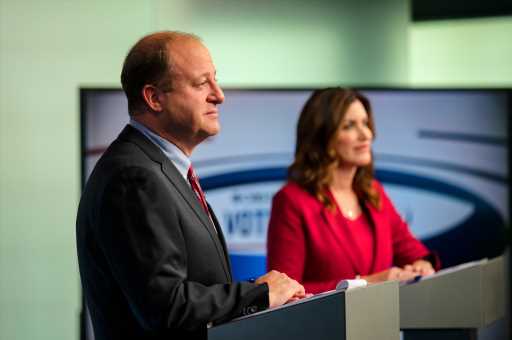Gov. Jared Polis won a convincing and expected re-election victory after opening an early and dominant lead over challenger Heidi Ganahl on Tuesday night, extending Democrats’ record-setting control of the state’s chief executive and signaling the limits of Republican gains.
“It has been the honor of my life to serve as your governor over the past four years, and it will be my honor to continue serving as your governor for the next four years,” a beaming Polis told supporters just before 8 p.m. at Democrat watch party.
As results continued to trickle in, Polis’s lead continued to balloon. By 7:45, he was up nearly 300,000 votes — 702,000 to Ganahl’s 424,000. Fox News, ABC and NBC had all called the race for Polis shortly after polls closed at 7 p.m. The Associated Press called Polis’s race shortly after 8 p.m.
As Polis spoke to a cheering crowd, a quiet ballroom at the Republican Party’s watch party in Greenwood Village watched national results trickle in Tuesday evening. A band struck up and the room began to fill shortly after Polis’s speech.
Polis, a five-term Congressman before running for governor in 2018, had cast himself as a problem-solving governor unmoored by strict ideological commitments and a data-driven leader who guided Colorado through the pandemic. While Ganahl, a CU regent and businesswoman, repeatedly blasted Polis’s handling of the economy and crime, the governor ran on his record — repeatedly touting efforts to save Coloradans money, early childhood programs he championed and protection of abortion access — and pledged to tackle ongoing issues like the cost of living and crime in a second term.
“Voters have shown clearly tonight that they support Polis’s positive vision for the state, and we look forward to moving Colorado forward together in his second term,” Morgan Carroll, the chairwoman of the Colorado Democratic Party, said in a statement.
Though a blow, the loss won’t come as a surprise to Republicans, who’d quietly accepted that Ganahl, a businesswoman and CU regent, stood little chance. Ganahl has consistently trailed behind Polis in polling. She had worked hard to frame the governor as the cause of the very problems he’s promised to solve; “Polis is the problem” was a frequent refrain at debates and campaign events.
Polis’s win extends his landmark time in Colorado politics. An internet and tech businessman, Polis won a seat on the state board of education — by a mere 90 votes — in 2000. He successfully ran for Congress in 2008 and served as one of its wealthiest members until he beat out Republican Walker Stapleton in 2018 to become the first openly gay man to serve as a U.S. governor.
Polis assumed that office amid a national electoral rebuke of the Republican Party and then-President Donald Trump. That rising blue tide swept Colorado Democrats into full control of the legislature and the three other statewide offices. But his first term was quickly colored by the pandemic, and Polis would spend the next 18 months leading — and then unwinding — the state’s role in combatting the crisis. The state would shut down briefly in spring 2020, a mask order would hold firm for a year, and rolling pandemic waves have killed more than 13,400 Coloradans to date.
A vocal proponent of vaccines, Polis used their arrival to extricate the state from its direct, and politically difficult, role in pandemic response. He repeatedly described his unwinding of statewide restrictions as an effort to give control to local leaders, but the decision also led to infighting in Denver suburbs and pleas for intervention from those very leaders. Ultimately, Colorado’s death and vaccination rates were among the best in the nation, facts Polis frequently used to defend criticism of his approach. Still, nearly 3,000 residents died in the months after he declared the emergency over in summer 2021.
Simultaneously, Polis, working with lawmakers and spurring on voters, earned landmark wins in transportation funding, expansion of kindergarten and preschool access across the state, and a series of efforts to save residents’ money, although often on a temporary basis. He’s pledged to make Colorado one of the 10 safest states in the country, and he’s taken steps to encourage tougher penalties for drug offenses and auto thefts, frequent attack lines from Ganahl and Republicans.
Ganahl, who founded a successful pet care franchise, remains the party’s only statewide elected official after two successive election cycles of reliable Democratic returns. She had sought to frame Polis the cause of the state’s ills, from inflation and the cost of living to crime and students’ test scores. “Polis is the problem” was her frequent refrain.
For the Democrats, Polis’s win extends the party’s record-setting control of the governor’s mansion. By the time Polis’s term ends in 2027, Democrats will have controlled the seat for two decades, a feat never accomplished by either party in the state.
When the legislature reconvenes in two months, Polis will be greeted with a familiar, but increasingly pressing, array of issues, from behavioral health to the cost of living and wildfire mitigation. The condition of the Colorado River and its ability to satiate the West is deteriorating, with federal intervention imminent. The housing market has cooled, but overall affordability remains a top concern for Coloradans as pandemic aid runs dry. Federal stimulus dollars from COVID have largely been allocated, and the state enters the same uncertain economic future that faces the rest of the country. Fights over drug penalties and other criminal justice issues appear certain. Democratic legislators, fresh with new faces and leadership, are preparing bills to further push back against Supreme Court decisions.
Source: Read Full Article

